Consistent Life Ethic
When thousands of abortion opponents gather Friday on the National Mall for their annual protest march, they will be united in their fierce passion for ending a procedure that the Supreme Court legalized 40 years ago in the controversial Roe v. Wade decision.
But they will also be more divided than ever on how best to rally people to join their cause: shock them with harsh slogans and graphic images of mangled fetuses, or convince them with reasonable arguments and affecting ultrasound images.
If activists are going to the March for Life “to display graphic photos or videos of aborted babies,” Simcha Fisher wrote this week in the National Catholic Register, a conservative outlet, “I’m begging you to reconsider.”
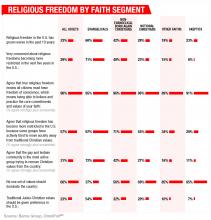
WASHINGTON — Half of Americans worry that religious freedom in the U.S. is at risk, and many say activist groups — particularly gays and lesbians — are trying to remove “traditional Christian values” from the public square.
The findings of a poll published Wednesday reveal a “double standard” among a significant portion of evangelicals on the question of religious liberty, said David Kinnaman, president of Barna Group, a California think tank that studies American religion and culture.
While these Christians are particularly concerned that religious freedoms are being eroded in this country, “they also want Judeo-Christians to dominate the culture,” said Kinnamon.
“They cannot have it both ways,” he said. “This does not mean putting Judeo-Christian values aside, but it will require a renegotiation of those values in the public square as America increasingly becomes a multi-faith nation.”
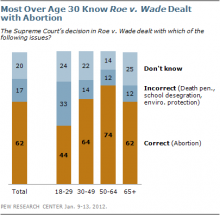
In the past four decades, American attitudes have changed markedly on gay marriage, smoking, bullying, and a host of other cultural issues.
But on Roe v. Wade, the 1973 Supreme Court decision that legalized abortion, public opinion today looks much as it did back then.
When it comes to American views on the legality of abortion, “the trend lines look about as flat as they can be,” said Daniel Cox, research director at the nonpartisan Public Religion Research Institute.
Just a few years after the justices decided Roe, Gallup pollsters began asking Americans about abortion. In 1975, 54 percent said it should be legal only under certain circumstances; last year, that figure was virtually unchanged, at 52 percent.
And the Pew Forum on Religion & Public Life this month found that 63 percent of Americans don’t want Roe overturned, a mere 3-percentage-point increase from 1992.
In more recent years, opinions on the morality of abortion have remained similarly stable, with about half of Americans (47 percent) calling it “morally wrong” and four in 10 considering it “morally acceptable” or “not a moral issue,” according to Pew.
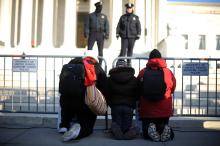
This is a memorable week: on Monday the inauguration of President Obama on the holiday honoring Martin Luther King, Jr., and today, the 40th anniversary of the Roe v. Wade decision by the Supreme Court. Some people will celebrate all three with thanksgiving. Others will find nothing to celebrate – especially the decision of January 22, 1973 that struck down state laws banning abortion.
Another Inaugural Address
On Sunday, there will be another inaugural address – this one by Jesus at the beginning of his ministry (Luke 4: 14-21). After 40 days in the wilderness facing the devil, Jesus returned to his hometown of Nazareth and went to the synagogue. He took his place at the reading desk and someone handed him the scroll of Isaiah. The text says he “found the place where it was written.” Jesus read the text, handed the scroll back to the attendant and sat down. Everyone was looking at him – all those hometown folks who knew him as a child. Then Jesus said, “Today, this scripture has been fulfilled in your hearing.” That must have been a shock because the Isaiah text Jesus read proclaims more than anyone could see: good news to the poor, release to the captive, recovery of sight to the blind, freedom for the oppressed – and the year of the Lord’s favor. The hometown folks would have recognized the year of Jubilee when debts would be cancelled, slaves set free and the land allowed to rest. Jesus was making a very big claim!
How shall we interpret what Jesus said in light of our deep divisions over abortion? Is the fetus in the womb oppressed or is the pregnant woman denied choices oppressed? Is the woman captive to laws that restrict her access not only to abortion but to contraceptives? Or is the fetus a captive threatened with death? We have grown so accustomed to shouting slogans at one another that it has become almost impossible to have faithful conversations across our differences.
Four decades after Roe v. Wade, the landmark Supreme Court ruling that legalized abortion, many opponents of the decision are in a celebratory mood while those backing abortion rights are glum, feeling that momentum is turning decisively against them.
Yet in reality, little has changed in the fiercest and most protracted battle of the nation’s bitter culture war.
Instead, what’s really going on is a case study in the psychology of movement politics, where activists have to rally supporters with cries of alarm without making them despair that all is lost. At the same time, they must offer evidence that their efforts are paying off without leaving them complacent.
It’s a difficult balancing act, and lately the abortion rights camp has been the one to sound the warnings.

WASHINGTON — Each January in the four decades since the Roe v. Wade decision legalized abortion in 1973, Nellie Gray marshaled tens of thousands of anti-abortion demonstrators for the March for Life rally.
Now, after Gray’s death in August at age 88, a woman less than half her age will take up the cause to lead marchers from the National Mall to the Supreme Court on Jan. 25 to protest the 40th anniversary of Roe v. Wade.
“On one hand, it’s a very somber time for me every year,” said Jeanne Monahan, the new president of the March for Life Education and Defense Fund. “I’m always a little saddened. And on the other hand, there is a youthful sort of energy and enthusiasm that’s there.”

Over the past few days on Twitter, NBC’s Ann Curry has almost single handedly popularized #26Acts, an initiative asking people to do 26 acts of kindness in honor of the 26 victims of the Newtown, Conn. shooting.
In line with Momma T’s famous quote, “ We cannot do great things on this earth. We can only do small things with great love,” Curry says that #26Acts originated with a simple principle in mind: “If you do good, you’ll feel good.”
But why does everyone have to Tweet about paying it forward? That’s a legitimate criticism and one that many a Twitter user have struggled with. As one person puts it, “While I get the intent of #26Acts fully, tweeting acts of kindness sometimes comes off as patting one's own back. Conundrum.”
Indeed. But even if these acts of kindness are sensationalized and socialized, they’re still encouraging people to do good — albeit in a potentially imperfect way.
So, in honor of those honoring those taken so suddenly, here are some of the most heartwarming #26Acts of kindness I’ve seen so far.

In the wake of the recent school shooting tragedy in Connecticut, we will undoubtedly hear the lament, 'America is at the crossroads', as we struggle to contain an increasingly violent society. Sadly, this country left the crossroads some time ago. We have passed the tipping point, and are rapidly descending into the abyss of chaos when it comes to respect for human life.
Well-meaning voices are sounding the alarm that things are different now — innocent children have died in great numbers in Connecticut. This is true, but people are dying every day in towns and cities throughout our nation due to acts of senseless violence. The deaths in Connecticut represent an unspeakable new low, but we have been steadily arriving here for decades.
We will rightly pray for and comfort the families and communities of the victims. We should do no less. There will also be calls for greater gun control. However, we can count on this: we cannot count on our governments to get this epidemic of violence under control. Nor can we retreat to the false comfort of innocuous statements such as, 'Guns don't kill people. People kill people.'

In a classic 1960 children's book, a baby bird toddles up to one critter after another asking, "Are you my mother?"
For some babies today, there's no simple answer — biologically or legally.
Advances in artificial reproductive technologies mean a baby could have three "mothers" — the genetic mother, the birth mother and the intended parent, who may be a woman or a man.
Statutes on surrogacy, adoption, divorce and inheritance vary state by state, court by court, decision by decision. For nontraditional couples, the patchwork of laws makes it even more complex. New York allows gay marriage but forbids surrogacy, for example, while Utah permits surrogacy but bans gay marriage.
People of all stripes are redefining what it means to be “pro-life” by upholding a consistent ethic of life—from womb to tomb. Take conservative luminary Richard Viguerie, for example.

Sidebar to "Gandalf, Gollum, and the Death Penalty"
EARLY IN J.R.R. Tolkien's The Fellowship of the Ring, Gandalf the wizard is talking with the hobbit Frodo Baggins about the dreadful Gollum. The frightened Frodo expresses his regret that his uncle Bilbo had not killed "that vile creature, when he had a chance!"
Because of "all those horrible deeds" that Gollum has done, Frodo adds, "He deserves death." Gandalf replies, "Deserves it! I daresay he does. Many that live deserve death. And some that die deserve life. Can you give it to them? Then do not be too eager to deal out death in judgment. For even the very wise cannot see all ends. I have not much hope that Gollum can be cured before he dies, but there is a chance of it."
I do not know where Tolkien stood on the issue of capital punishment, but Gandalf offers theologically relevant points about innocence, guilt, judgment, and hope that Christians should seriously consider as heated debate continues about the morality of this lethal governmental practice.
While a majority of Americans still view capital punishment as morally justified, there is growing opposition to it. Indeed, the number of death sentences dropped to a 35-year low in 2011, and the annual number of executions since 1999, the year in which the most persons were put to death, has with a few exceptions continued to decrease. Seventeen states have abolished capital punishment, including Connecticut, which outlawed the death penalty on April 25, 2012, for any future crimes committed. In 2012, 12 states had active legislation to end it. Why?
Much of the rethinking, even among "law-and-order" conservatives, centers on 1) mistakes that may lead to wrongful convictions and the executions of innocent persons, 2) unfairness in its application, especially in connection with racial and economic biases in society and in the criminal justice system, 3) data that call into question whether capital punishment is an effective deterrent to violent crime, and 4) the high costs for states (and therefore for taxpayers) to implement it (see box on facing page).
While the empirical studies and criminological research are very important, for Christians it is the theological and biblical framework that should ultimately determine our stance on this contentious issue.
RICHARD VIGUERIE is as responsible as anyone for the success of the conservative movement in this country. A pioneer in political direct mail, Viguerie has been involved from the radical edges of the Right in every Republican campaign from Goldwater to Romney; he's been called the "funding father of the conservative movement." He helped start hundreds of entities from Conservative Digest to Gun Owners of America, from the National Conservative Political Action Committee to the Moral Majority—spanning the political spectrum from Right to Far Right. Just before the 2012 election, he launched MyOwnSuperPAC because of "frustration at how weak and ineffective the Romney campaign's ads have been with its soft approach to Barack Obama—hardly ever mentioning Obama's radical, neo-Marxist vision for America's future," and insisting that "Obama is NOT failing. He's succeeding at doing exactly what he set out to do—and that's destroy capitalism and destroy the America you and I grew up in." So no one is going to mistake Viguerie for a squishy liberal.
And yet Viguerie's Catholic faith has led him to a surprising position on the issues of capital punishment and prison reform. The conservative icon talked with Sojourners editor-in-chief Jim Wallis in September about why he thinks an unexpected Left-Right alliance might turn the tide against the death penalty.
Jim Wallis: As you and I both know, we're often stuck in political straitjackets. There are issues that we could work together on, particularly as people of faith, that would help politicians do better than they sometimes do. I'd like to start with this: You've said that, as a Catholic, you're against the death penalty. Why is your faith as a Catholic central to this, and how has that turned you against the death penalty?
Richard Viguerie: My own road to Damascus on this issue came many years ago. When I was a young Republican in Houston in the late '50s and early '60s, I was a very hard-core, law-and-order type: "lock 'em up, throw the key under the jail so they never get out." In those days, law enforcement agencies were kind of immune from criticism. Over a period of time, I and many other conservatives have been disabused of the fact that people in law enforcement are above any mistakes or abuse of power.

I AM AGAINST the death penalty in principle. The deliberate killing of prisoners does not demonstrate our society's respect for life, which we are trying to teach—especially to those who violate it. We simply should not kill to show we are against killing. It's also easy to make a, yes, fatal mistake, as alarming DNA testing has demonstrated, revealing some death row inmates to be innocent. In addition, the death penalty is clearly biased against poorer people, who cannot afford adequate legal representation, and is outrageously disproportionate along racial lines. The facts are that few white-collar killers sit on death row, and fewer are ever executed. And there is no evidence that capital punishment deters murder; the data just doesn't show that.
At a retreat I attended a couple of years ago, conservative activist Richard Viguerie approached me and said, "Jim, let's do something together to really shake up politics." Viguerie had become a friend, so I asked him what that might be. "I am a Catholic," Viguerie said. "I am against the death penalty, and I think it's time for conservatives and liberals who agree on that to begin to work together." I was fascinated at the thought of unlikely partners helping to accomplish that together. So we have had several dinner meetings over the last two years with both conservative and liberal leaders—mostly people of faith—to discuss the issue.
Here are some basic facts. There have been 1,312 executions since 1976, when the death penalty was reinstated following a 10-year moratorium. There were 43 prisoners killed in 2011, and 35 so far in 2012. As of April 2012, there were 3,170 people on death row. Forty-two percent are black, 43 percent are white, and 12 percent are Latino. Thirty-three states have the death penalty; 17 have abolished it and several have abolition legislation pending. Since 1973, 141 people have been exonerated and set free from death sentences because of new evidence—people who shouldn't have even been prisoners and were almost killed by the state due to false or faulty evidence. Eighteen of them were released because of DNA evidence. Who knows how many people have been executed unjustly?
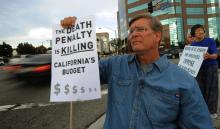
October was Interfaith Month for Prop 34, a time set aside for leaders of faith traditions to address the question of California’s death penalty and advocate for its replacement. Hundreds of faith community’s have endorsed Proposition 34 because we believe the best way to do justice in California is to replace the death penalty with life in prison with no possibility of parole.
The will to see justice done is deep within the human spirit. We may not always agree on what “justice” looks like, but the belief in a just and fair society — and the desire to bring it about — are at the heart of how we live together and form a community. In religious traditions like Christianity, Islam, Judaism, and countless others, doing justice is a calling to enact God’s will.
The next question is, of course, what does that mean? Discerning justice can be even harder than doing justice.

PORTLAND, Ore. – Future generations could be stripped of mutations such as hereditary blindness or maternal diabetes, after a breakthrough study at Oregon Health & Science University.
But the new technique is also one short step from genetic design of future generations, said Marcy Darnovksy of the California-based Center for Genetics and Society. "These powerful new technologies have a whole bunch of wonderful and appropriate uses – and a number of ways they can be misused.
The researchers, led by OHSU biologist Shoukhrat Mitalipov, modified unfertilized eggs for the first time, a technique that offers great promise as well as ethical pitfalls. Such research is banned in many countries.
Three years ago, the Russian-born Mitalipov made headlines with experiments that created monkeys with genetic material from three parents. Now, his team has done it with human cells, setting the stage for possible experiments with humans.
The procedure dealt with what's called mitochondrial DNA, the small part of the cell that turns food into energy. Mitochondrial disorders can lead to neuropathy (a type of dementia) and nervous system disorders such as Leigh disease.
In a study published Wednesday in the journal Nature, the OHSU team described successfully transferring DNA from donor cells into other donor cells, fertilizing the eggs to create 13 tiny early embryos of roughly 100 cells each. These pre-embryos, called blastocysts, were converted to embryonic stem cells for future research.
Key to the technique: replacing the defective mitochondrial DNA with healthy genetic material from the egg of a second woman.
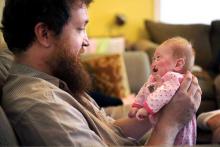
NASHVILLE, Tenn. -- Eric and Ruth Brown believe nothing about daughter Pearl Joy's life is a mistake.
They say God gave Pearl her bright red hair and wide blue eyes, as well as the genetic disorder that created a cleft in her upper lip and caused her brain's development to stall in the first weeks in the womb.
"Things didn't go wrong," Eric Brown said. "God has designed Pearl the way he wanted, for his glory and our good."
That belief has sustained the Browns during the past six months, ever since a routine ultrasound revealed that the couple's third child has alobar holoprosencephaly, a rare genetic condition that's almost always fatal. A specialist told the Browns she would probably die in the womb and advised them to end the pregnancy early.
It's one thing to talk about God's will when life is good. It's another when a doctor is saying your baby won't live.
The Browns were forced to consider religious, medical and ethical issues most parents never will. And nobody could make their decision for them.
The Browns never considered abortion. They believe that Pearl is "fearfully and wonderfully made," as Psalm 139 puts it, and God alone should decide when she lives and when she dies.
Seeing Pearl's beating heart on the ultrasound also persuaded them to continue the pregnancy, even if the odds were stacked against her.
"If there is a chance, you say yes to that chance," Eric Brown said. "The only thing I know about parenting is that you say yes."
So far, Pearl has beaten the odds.
Few babies with Pearl's disorder make it to term, and of those who do, only 3 percent survive birth, according to the Dallas-based Carter Centers for Brain Research in Holoprosencephaly and Related Malformations. Pearl has a particularly severe form of the condition, which means her brain never divided into two hemispheres.
She turned 11 weeks old Oct. 12, a milestone that the Browns celebrated by lighting 11 candles and singing "Happy Birthday."

BEND, Ore. — State labor officials have ordered a dentist to pay nearly $348,000 to settle allegations that he threatened to fire a dental assistant unless she attended a Scientology-related training session.
The Bureau of Labor and Industries contends Dr. Andrew W. Engel repeatedly "badgered" Susan Muhleman about the three-day conference despite her concerns that it would conflict with her Christian beliefs. He also turned down her request to attend secular training instead, investigators said.
As a result, Muhleman quit AWE Dental Spa in August 2009 — weeks before the conference — and moved out of state to find a job, the state agency said.
Muhleman said she was opposed to going to the Scientology conference but worried about losing her job at the height of the recession, when the local jobless rate was about 15 percent.

Family Research Council President Tony Perkins said Sept. 12 that conservative Christians are growing more enthusiastic about GOP presidential nominee Mitt Romney, and predicted they would show up at the polls in record numbers in November.
"When it comes to the values of family, values of faith, values of freedom, Mitt Romney is a clear choice, I think, for value voters across this country," Perkins said at a National Press Club luncheon two days before his organization kicks off its annual Values Voter Summit in Washington.
Perkins, a Southern Baptist, said evangelical Christians have "significant theological differences" with Romney, a Mormon, but he said the GOP nominee, if elected, would not be asked to head a national church.
"We don't want a national church. We want religious freedom," he said. "I think someone who has been a part of a persecuted religion is going to be even more sensitive to the issue of religious freedom."
